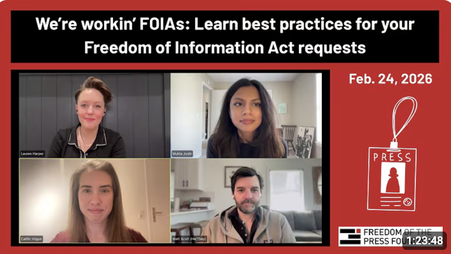A recent court filing suggests the U.S. government is abusing the Freedom of Information Act to hide potentially damning evidence about its arrest of Tufts University student Rümeysa Öztürk.
The government told Freedom of the Press Foundation (FPF), in response to a lawsuit we’ve filed for Öztürk’s records, that it wouldn’t release any information because doing so would be an invasion of privacy, although it’s not clear whose.
Yes, there are legitimate reasons to shield personal information from public disclosure. But this is obviously a self-serving attempt to hide evidence that the government retaliated against Öztürk for exercising her constitutionally protected right to free speech.
Öztürk targeted for op-ed
In March, Öztürk co-authored an op-ed that was critical of the Israeli government.
Shortly thereafter, she was identified by the pro-Israel group Canary Mission as having engaged in “anti-Israel activism.” (Even though the group’s smear campaigns shouldn’t carry any legal weight, Immigration and Customs Enforcement officials have testified that they regularly rely on Canary Mission’s website to compile reports.)
Despite supposed protections for free speech and the absence of any crime, Öztürk was soon arrested by immigration agents on the grounds that she supported terrorist organizations and engaged in antisemitic activities.
The government’s own records undermine these charges, and that’s why we are suing for their release.
Using FOIA exemptions as an invisibility cloak
On June 9, FPF, represented by Loevy + Loevy, filed a FOIA lawsuit against the State Department for two key memos that undercut the government’s accusations against Öztürk.
The first memo states that President Donald Trump’s administration “had not produced any evidence” linking Öztürk to terrorist organizations or antisemitic activities, despite the administration’s claims.
The second memo says the agency was revoking her visa anyway.
These records are significant, both for Öztürk and all potential victims of the government’s efforts to stamp out dissent. But on Aug. 22, the government said it couldn’t release any part of either memo — not even a subject line. It argued that doing so would, among other things, harm protected privacy interests.
FOIA’s exemptions, including for privacy, are supposed to be applied with precision and not used as an invisibility cloak for information the government doesn’t want released.
Yet that is exactly what’s happening here.
The government’s position is insulting, considering that by concocting reasons to send Öztürk to a detention center in Louisiana for a month and a half, it has already committed the most grievous privacy violation.
The government also claimed that releasing portions of these records would reveal law enforcement techniques for investigations and prosecutions. But the techniques aren’t secret: The administration advertises on social media how it uses the immigration process as a cudgel against critics and perceived enemies. For it to then try to deny those same facts in a FOIA lawsuit is utter nonsense.
We are going to keep fighting for the release of these records. Not only are they necessary for Öztürk to defend herself if the Department of Homeland Security continues trying to deport her, they will shed light on the government’s increasingly brazen and illegal targeting of journalists.
State Department, we will see you in court.





